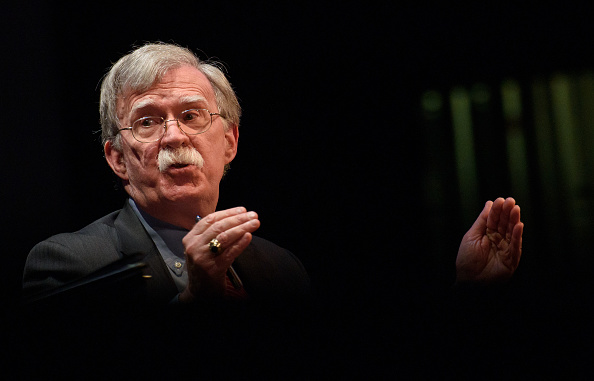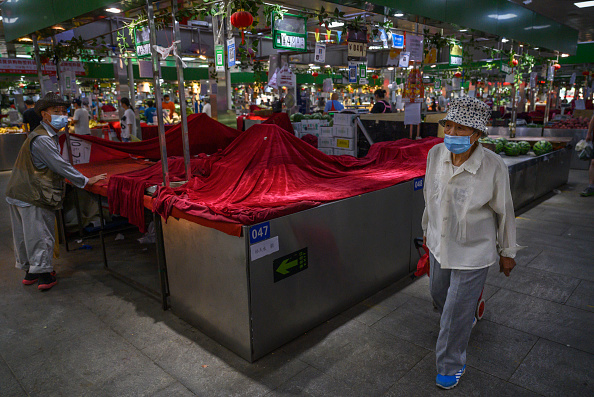
 Bolton Bombshell
Bolton BombshellAn explosive excerpt from former U.S. National Security Advisor John Bolton's forthcoming memoir this week highlighted new behind-the-scenes details of the Trump administration's negotiations with China, painting a picture of an administration lacking a consistent policy towards the bilateral relationship. The former National Security Advisor made revealing claims that President Trump asked Chinese President Xi "to ensure he'd win" the upcoming election, hinted approval at China's policies in Xinjiang, and described Xi as "the greatest leader in Chinese history." Trump immediately rebuked Bolton's claims, calling him a liar and explaining that the assertions were little more than the disgruntled claims of an angry former employee.
The news overshadowed Wednesday's "constructive" talks between Secretary of State Mike Pompeo and China's top diplomat Yang Jiechi – a rare face-to-face meeting between the two powers. During the meeting, China agreed to step up purchases of US agricultural goods, after China's purchases slowed following the coronavirus outbreak. Commenting on the meeting, a Chinese foreign ministry spokesperson said that Yang had reiterated China's positions on Taiwan and Hong Kong policy. He also criticized America's "double standards on counter-terrorism issues" in passing the Uighur Human Rights Policy Act. The act allows the U.S. to impose sanctions on Chinese officials involved in the deprivation of "the right to life, liberty, or the security" of people in Xinjiang.
After the meeting, President Trump once again raised the possibility of ending relations with China, tweeting that "the U.S. certainly does maintain a policy option, under various conditions, of a complete decoupling from China." For more on the trajectory of the U.S.-China relationship, read "Tactics Matter" from An Gang, Research Fellow at the Center for International Strategy and Security at Tsinghua University.
 COVID-19 Resurfaces
COVID-19 ResurfacesBeijing went on high alert after a new outbreak of COVID-19 was recorded in the city's Xinfadi market earlier this week. The cluster of cases – the first in 56 days in the city – forced the government to reimpose infection control restrictions; thousands of flights were cancelled, schools were closed, and taxis were banned from transporting anyone across city limits. The chairman of the market suggested that imported salmon was to blame for the outbreak, causing the fish to be quickly removed from supermarket shelves and restaurants across China. China also halted imports of European salmon, causing Norwegian salmon shares to drop 3-5% Monday. Chinese officials suggested that this particular strain originated from Europe after releasing the genome sequence of Beijing's latest outbreak to the World Health Organization.
A recent survey showed that a total of 3 out of 53 countries surveyed believe that the U.S. demonstrated a stronger COVID response than China. The survey, co-conducted by a German polling firm and a Denmark-based nonprofit, polled 120,000 people from 53 countries and found that one third of those polled felt that the U.S. responded well to the pandemic. Currently, China has 83,352 reported cases of the coronavirus while the U.S. has over 2.2 million.
 Face Off
Face OffTensions between India and China have flared once again after twenty Indian soldiers were killed by Chinese forces in a "violent face-off" earlier this week. The stand-off, which marks a new low in the relationship since the Sino-Indian War in 1962, was allegedly triggered after Chinese troops pitched tents and moved heavy equipment onto the Indian side of the disputed Himalayan border. It is currently unclear how many casualties China suffered. Despite a brief phone call between the Indian and Chinese foreign ministers, tensions ratcheted to alarming levels. Indian government officials have called for an increase on import duties of Chinese products, and for a general boycott of Chinese products in the country. The threats caused India to terminate a huge railway contract with Chinese company China Railway Signal and Communication Corporation; and Chinese phone manufacturer Oppo called off the launch of its new 5G phone in India. High level talks between India and China resumed today. "We hope India can work with China to maintain the long-term development of bilateral relations," Foreign Ministry spokesman Zhao Lijian said at a daily briefing.
India has also looked to strengthen its bilateral ties and its presence in multilateral organizations - it was recently elected to a non-permanent seat on the United Nations Security Council, as well as a seat on the executive board of the World Health Organization. Earlier this month, India and Australia also signed a defense pact that grants both countries access to each other's military bases, to counterbalance the growing weight of China in the region.
Prepared by China-US Focus editorial teams in Hong Kong and New York, this weekly newsletter offers you snap shots of latest trends and developments emerging from China every week, while adding a dose of historical perspective.
- 2020-06-13 Fits and Starts
- 2020-06-06 Confluence of Crises
- 2020-05-29 Questions of Autonomy
- 2020-05-22 Pandemic Decisions
- 2020-05-16 Fractures and Fault Lines
- 2020-05-09 Attacks and Counterattacks
- 2020-05-02 Retaliatory Actions
- 2020-04-24 Sinking Perceptions
- 2020-04-18 Pandemic World
- 2020-04-11 The Long Road Back to Normalcy
- 2020-04-03 Shifting Gears
- 2020-03-28 Cooperation or Confrontation
- 2020-03-20 World in Turmoil
- 2020-03-13 Global Emergency
- 2020-03-06 Global Strains
- 2020-02-28 Coronavirus Gone Global
- 2020-02-22 The Virus Continues
- 2020-02-15 Asserting Control
- 2020-02-08 A Novel Outbreak
- 2020-01-31 Global Health Emergency Declared